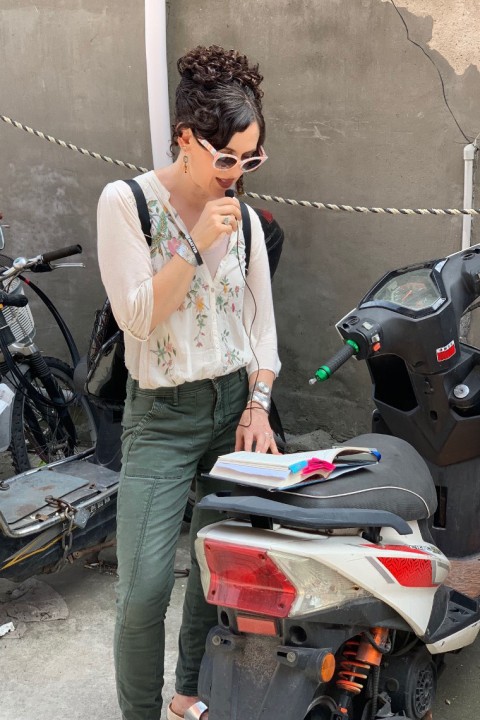A professor, novelist and poet, Rachel DeWoskin is the kind of person who has seemingly lived a million lives in one.
After graduating from college, she headed to China to work as a public relations consultant, but landed a role as a star of the soap opera “Foreign Babes in Beijing.” After returning to the U.S., she wrote a memoir about the experience under the same title, which has been optioned by Paramount Pictures. Aside from traveling across the country on book tours, DeWoskin splits her time between teaching fiction at UChicago and writing more work of her own.
DeWoskin teaches a variety of courses in the College, from Arts Core classes to thesis project advising. This year, her courses include: “Technical Seminar in Fiction: 3-D Character Builder,” “Advanced Fiction Workshop: Constructing a Full Length Novel,” “Reading as a Writer: Beauty is Truth, Truth Beauty” and “Thesis/Major Projects: Fiction.”
DeWoskin is also the author of seven books: “Foreign Babes in Beijing” (2005), “Repeat After Me” (2009), “Big Girl Small” (2011), “Blind” (2015), “Someday We Will Fly” (2019), “Banshee” (2019) and “Two Menus” (2020). Her new poetry collection, absolute animal, is forthcoming from The University of Chicago Press in fall of 2023, and she has just finished drafting a new novel.
She spoke to the College about the inspirations behind her work, her storytelling process, and her upcoming projects. This interview transcript has been edited for length and clarity.
You serve as both a professor and a working writer. How do your two roles influence each other?
The intersections between being a professional writer and professor have to do with intellectual wonder, curiosity, and ways of working out questions about art and the world. My writing explores transnational experience, particularly questions of how human beings communicate across linguistic, cultural, and national borders. In many cases, my students are working on questions about human behaviors and motivations and what it means to be a citizen of the world. While each of us works in an individual way about the questions that compel us most, there’s often overlap in our interests and examinations.
For me, language is our best bet for conveying and exploring the questions and experiences that connect us to all the human beings, as Baldwin once put it, who are alive or who have ever been alive. And of course that’s what writing does: it lets you inhabit worlds, points of view, and lives that aren’t identical to yours. Reading allows for that; writing requires it. And that work, of literary imagining and empathizing, makes sense to me in all the genres: poetry, fiction, creative nonfiction, lyric essays, translation — and also, importantly, in the lab of my classroom.

What does a typical day in your life look like?
I have kids, so I typically make them breakfast, drop them at school, go to the UChicago pool, swim for 45 minutes, then write for two hours, or read if I can't write. After that pretty lovely morning, I meet with my students and talk about their work and our work together in the classroom.
I also teach in the afternoons on Tuesdays at the Stateville Correctional Center in Crest Hill, Ill. So I meet with my students there and we also talk about books and the world, our lived experience and our dreamt experience and the things we wonder and think about and try to write about. We revise our writing in every case, every day, in every classroom, just as I do in all of my projects.
What does the process of outlining and writing a book look like, start to finish?
It depends on the book. I have a poetry collection coming out in the fall. The main difficulty of putting that book together was getting the poems to be in the right conversation with one another, finding the resonances between them and finding a way in which the book could move. A poetry collection doesn’t want to mimic fiction exactly, but still has to end somewhere different from where it began (which is also true of the individual poems). A collection should also have sonic, metrical surprises in it, yet stay plausible across the poems.
The poems in "Two Menus" focus on moments shaped by dualities; spaces bordered by English and Chinese languages; and the liminal spaces between youth and adulthood, safety and danger, humor and sorrow. I worked to build and demolish boundaries and binaries, moving, sometimes uncomfortably, from the familiar to the strange in a way meant to upend some of our most basic assumptions and confusions.
In my novels, I spend a lot of time researching, and that takes years in some cases. My most recent novels are an interesting case study in the differences between books: one is a historical novel, set during WWII in Japanese-occupied Shanghai, where 25,000 Jewish refugees survived the war. That novel took almost a decade to research and write, because I needed to understand not just the history of that community, but also the feelings of the neighborhoods in Shanghai, the stakes for individual families, and the ways all the languages fit (and didn’t fit) together. The other, published the same year, is a largely interior novel called "Banshee," set over three weeks during which a woman has a crisis and burns her own life to the baseboards.
I did some research for that, into the medical industrial complex, but it was mostly writing as if I were escaping a fire, and the project took under two years to make. At the moment, I’m working on a novel set in a maximum security women’s prison. I’ve been researching and interviewing and reading for four years while writing. I imagine the story of an individual living in a context I find compelling, and then I work to make sure the world of the novel feels artistically certain and full, and that the individual’s life and concerns matter.